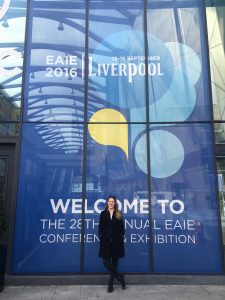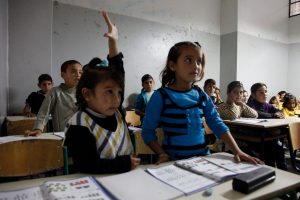by Caity Jackson
Director of European Engagement

Unusually hot weather welcomed me to the town where The Beatles famously made their debut. Coincidentally, the theme of the conference was ‘Imagine’, with a strong emphasis of thinking outside of the box and engaging everyone’s imaginative side in relation to European and international education.
But ‘imagining international education’ had a more serious tone this year, with the presence of sessions focusing on refugee education and how to increase inclusivity in all aspects of the recruitment, delivery, and evaluation of the educational process. How are we making international education possible for all?
This year, the EAIE conference held a track focusing on refugee education, in an attempt to address and respond to the refugee crisis in Europe. These 13 events focused on fair admission, recognition of international educational attainments, and how Germany is responding to the influx of refugees through intercultural certifications and integration programs.
Not only being represented through sessions and posters, refugee education wove itself into the opening and closing plenary of the entire conference. Kilian Kleinschmidt began his keynote address with harrowing figures: 1.2 million people have been displaced from their homes over the last year, with the total budget available for all aid, including refugees, natural disaster assistance, etc, worldwide, adding up to approximately US$20 billion. “Compare that to the money spent on real estate development and you understand why aid is the wrong concept. Aid is an arrogant concept of charity”, Killian asserted.
‘Imagining’ again that education for all is within our grasps, sessions focused on overcoming the barriers international education recruiters/marketers, administrators, and alumni coordinators face when it comes to a mobile population. How can we value our prospective and current students and erase the dollar sign universities associate them with? How can we increase diversity on campus while ensuring students have all the services they need to succeed at their fingertips? In only a few days, participants left with imaginative answers, if not even more questions to guide their work.
Diversity has always been a focus of the work that CFHI has engaged in. We imagine a world in which there are no barriers to the enriching experience cross-cultural learning can give. Our many scholarships aim to address these barriers and we are proud of the breadth of diversity in our scholarship applicants and successful candidates and we are honoured to walk side by side with our partner organizations.
Wrapping up this event that saw over 5000 professionals from over 90 countries gather in the spirit of increased global cooperation, Melissa Fleming of the United Nations High Commissioner for Refugees (UNHCR) told stories of those that our work has not reached. These stories from some of the most dire situations of the world, where the hunger to learn is beyond any of our comprehensions, was the inspirational closing we needed. Melissa began her talk with an account of her experience taking her own daughter through the steps of studying in France. She then told us about Esther, a young refugee whose main aspiration is to become a neurosurgeon. The contrast, in terms of opportunities for these two equally young and motivated women, is evident. If education offers life opportunities, why are we failing to provide this to those who need it most? As Melissa put it: “my daughter’s future is in her hands, Esther’s is in ours.”

